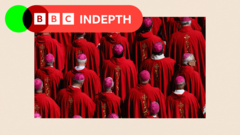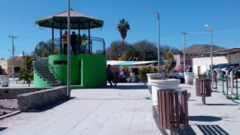With the imminent papal conclave, cardinals face a diverse array of views on how to build upon Pope Francis' legacy while also addressing complex challenges facing the global Catholic community, highlighting a poignant moment in the Church's future.
A Pivotal Moment for Catholicism: Cardinals Prepare for Conclave Amid Diverging Visions

A Pivotal Moment for Catholicism: Cardinals Prepare for Conclave Amid Diverging Visions
As the conclave to elect the next pope approaches, the division among cardinals reflects the complex legacy of Pope Francis and differing global priorities within the Catholic Church.
In the coming weeks, the Vatican's Santa Marta guesthouse, featuring 128 rooms, will host 133 cardinals poised to elect the next pope following Pope Francis' passing on Easter Monday. A symbolic red ribbon still seals one room, marking the transition into a new era after Francis’ impactful 12-year reign, during which he appointed about 80% of current cardinals. His legacy challenges the Church to progress beyond its hierarchical structure toward engagement with the world's faithful, emphasizing the needs of the underprivileged.
Discussions leading up to the conclave reveal a mixture of support and skepticism regarding the continuation of Francis’ approach. While many express a desire to maintain and build upon his reforms, vocal critics remain, concerned about his shifts away from traditional practices. The stark contrast in perspectives raises questions about whose vision will prevail in shaping the next papal leadership.
This year's conclave is notably diverse—marking a first-time representation from countries like South Sudan, Papua New Guinea, and Cape Verde—an evolution facilitated by Francis’ appointments. The initial assembly saw cardinals debate differing priorities shaped by their regional challenges; while European representatives focus on revitalizing shrinking congregations, their peers in Africa and Asia seek assistance with pressing social issues.
The dual role of the pope—both as a spiritual leader and a statesman—underscores the expansive influence the Vatican wields in global matters. Francis considerably amplified this role, becoming a voice for marginalized communities and advocating for peace. Many outside the faith now regard the papacy as a beacon of hope for critical global concerns—from climate change to the dignity of migrants.
Although reflections on Francis’ vision resonate strongly with many attending his funeral, they highlight a prevailing yearning for clearer guidance on governance and Church administration. Handling long-standing issues of sexual abuse and corruption remains paramount, yet even among supporters of change, a lack of clarity exists regarding the application of reforms.
In the backdrop of the conclave, deeply rooted divides continue to surface, with some cardinals expressing concerns of Francis’ leadership, suggesting he overstepped boundaries. However, as they prepare to convene in the Sistine Chapel, the call for unity is palpable amidst these tensions, as they reflect on a collective duty to choose a successor capable of addressing the diverse and ever-changing needs of the global Catholic Church, guided by both tradition and the aspirations of the faithful.




















